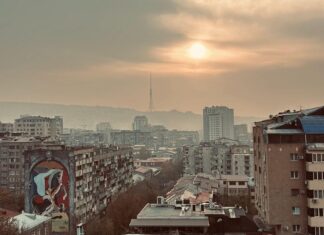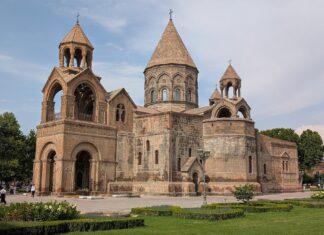By Vahan Zanoyan
The devastating defeat of Armenia and Artsakh in the 44-day war has understandably led to an avalanche of analyses, controversy, finger pointing, misinformation and a never-ending cycle of blame and counter-blame. Having been misled that victory was at hand during most of the war, the nation is in shock. Even though little is known about the specific details of the war, there seems to be no shortage of explanations and conclusions from all sides on both social media and news media.
But perhaps the most dangerous phenomenon that has resurfaced is an old mindset best known by its proponents, First President Levon Ter Petrosian and his one-time advisor, Gerard (Jirair) Libaridian. In a nutshell, this mindset advocates that Armenia should look realistically at its strengths and weaknesses vis a vis its adversaries, not confuse wishful thinking with a strategy, abandon ambitions that are clearly beyond its means to achieve, embrace peace and coexistence with its neighbors, trade territory for economic and physical security, avoid the slightest provocation, military or diplomatic (such as mentioning the Treaty of Sevres) directed at Turkey or Azerbaijan, and hope that by thus appeasing them, it shall enjoy peace and prosperity. The mindset claims that Armenians suffer from a political culture that relies on dreams and that we allow our illusions to guide our judgement. Recently, the Ankara-based Turkish think tank, AVIM, published a commentary presenting Libaridian’s views, calling them a sober wake-up call and praising Libaridian’s pacifism, foresight and the accuracy of his predictions. Clearly, this mindset is music to Turkish ears, and for good reason.
What makes the Ter Petrosian/Libaridian mindset especially dangerous today is that it has resurfaced with a vengeance and with a “we told you so” addendum, which, given the enormous losses of the war, has begun to find resonance with an already demoralized, disillusioned and confused public. After all, we just lost a war they said we could never win, which to many unsuspecting observers, proves not only that they were right, but that their reasoning was right, too. This is dangerous because nothing could be further from the truth.
Let me start with the concept of realism. To assess a given situation correctly, as it really is, with no interference from emotions and prejudices, and to accept facts as they are, is being realistic. However, to assume that today’s realities will be the realities of tomorrow, that we have no power to shape or change them, that external circumstances either do not change, or, as they change, they do not present opportunities for changing one’s circumstances, is not realistic. It is based on a static view of the world. The ‘Static Mindset’ is not about just accepting, but also succumbing to the realities of the moment. In short, it is defeatist. It lacks the vision and ambition to realistically shape a different future than the present. No political leadership can serve the nation it leads with a Static Mindset, because having a realistic vision for the future and the determination to pursue that vision are prerequisites for effective political leadership.
Yes, we lost the war, but not for the reasons the advocates of that mindset give. We lost the war because right after the victory and Bishkek ceasefire agreement of 1994 we did not consolidate our gains through international legal measures and through intensive, deliberate and goal-oriented diplomacy to secure the status of Artsakh and reverse the prevailing international acceptance that it is an integral part of Azerbaijani territory. Because we stayed intoxicated with our victory far too long and failed to upgrade our military. Because we spent the last 26 years in complacency and corruption. Because we did not have a clear and attainable vision of an economically advanced, militarily defensible, prosperous Armenia and Artsakh, nor enough dedication to our statehood to pursue such a vision. Because Armenia’s political and military leadership happily lingered in the tired assumption that Armenia could always rely an external guarantor of its security, ignoring the ways in which the world, the region, and the circumstances of that presumed guarantor were changing. Because we did not invest in our capabilities and in strengthening the country, and our political leadership throughout independence, taking the prevailing status quo for granted, was more interested in enriching itself than in building the state and populating all of the territories under Armenian control.








